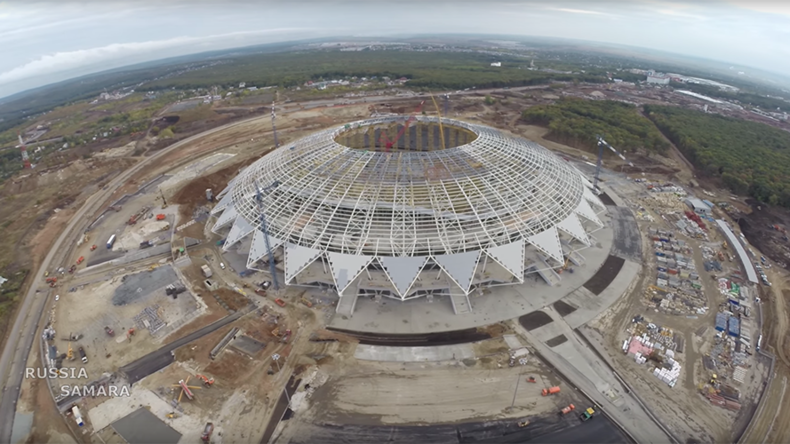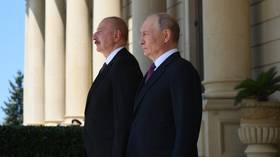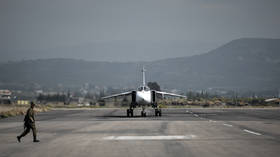‘Construction delays, but local govt vows to finish ASAP’: FIFA on Samara 2018 World Cup arena

FIFA has inspected the football arena in Samara, one of 11 Russian cities selected to host matches of the 2018 World Cup. Although there have been construction delays, local authorities promise to finish the work in time, FIFA’s competitions director said.
“A key focus of today is looking at the facilities, looking at the construction process and progress. It’s clear there have been delays in this project – it’s a complicated roofing structure, a lot of steel and metal work,” FIFA Chief Competitions and Events Officer Colin Smith said following the site inspection.
Smith and his team arrived in Samara, which lies on the Volga River around 1,000km east-southeast of Moscow, after wrapping up their visit to Ekaterinburg in the Urals Wednesday.
“We are obviously therefore concerned by any such delays in the project [in Samara], but we have received full commitment from the governor and from the regional local authorities that everything will be done in order to finish as soon as possible,” Smith said.
The 45,000 capacity Samara Arena is still under construction, and the crucial operation to cover the dome is now underway.
“There are detailed plans in place, there is a lot more workers on site and resources being made available for the contractor. All parties now know what they need to do. I think the next two to three months will be a critical phrase and we will monitor closely,” Smith added.
“There are many phases to completion [of the stadium]: from construction completion, engineering works. We, as FIFA, require a significant event overlay for the World Cup itself,” Smith said.
“The important thing for us is that there is sufficient time to test the stadium in operational mode with several test matches.”
The dates for those matches have not been confirmed yet, but such trial matches are “critical,” he added.
FIFA, world football's governing body, is inspecting the construction progress at all the Russian venues that will host the international showpiece starting in June 2018.
“It’s the second stop on the inspection visit and these visits are critical in our planning for the FIFA World Cup,” Smith noted.
“Each visit allowed the functional areas from FIFA and the Organizing Committee to work together with the venue managers and the stadium managers in order to plan the use of the facilities and the flow.”
Workers at the stadium are currently engaged with mounting the huge roofing structure, accompanied by the application of an anti-corrosive layer to the stadium’s metal dome. Preparatory work on the pitch has also begun, in addition to the decoration work in and outside the facility.
“From what we’ve seen when you’re inside in the bowl of the stadium, we can imagine the atmosphere that’s going to be in there… the seats, the view to the pitch is spectacular,” Smith said. “The proximity to the pitch from all the seats is great. It’s a real football stadium.”
READ MORE: Almost 1mn applications already submitted for FIFA 2018 World Cup Russia tickets - FIFA
“A critical part of any stadium is obviously the pitch. It is what matters most at the end of the day, it’s where the teams perform,” he said. “So we want to make sure that the pitch goes in before winter.”
According to Smith, the space around the stadium allows “for close proximity to all the support infrastructure that we need.”
“The 90 minutes of a match are the most important, but people will come and spend many hours on the site when they arrive before kick-off.”
FIFA will continue working with the local authorities on “public transport routes, how people can conveniently get from the city to the stadium and then back again after the match.”
Smith said that the main focus of such FIFA visits to the host city is always the stadium, but the city’s infrastructure is crucial too.
“But a host city is not only a host city only with a stadium. We need to look at hotels, airports, roads, public transport facilities,” he said.
“We received a very warm welcome from the city, the governor and the local authorities,” Smith noted.
After Russia won the bid to host the global football spectacle in December 2010 – 11 cities and 12 stadiums were selected to host the 2018 World Cup. In addition to Samara, St. Petersburg, Sochi, Kazan, Saransk, Kaliningrad, Volgograd, Rostov-on-Don, Nizhny Novgorod, and Yekaterinburg will welcome fans between June 14 and July 15. Matches in the Russian capital will be split between the two main Moscow stadiums.
Editorial note: The initial version of this article contained inaccurate quotes and has been changed.













